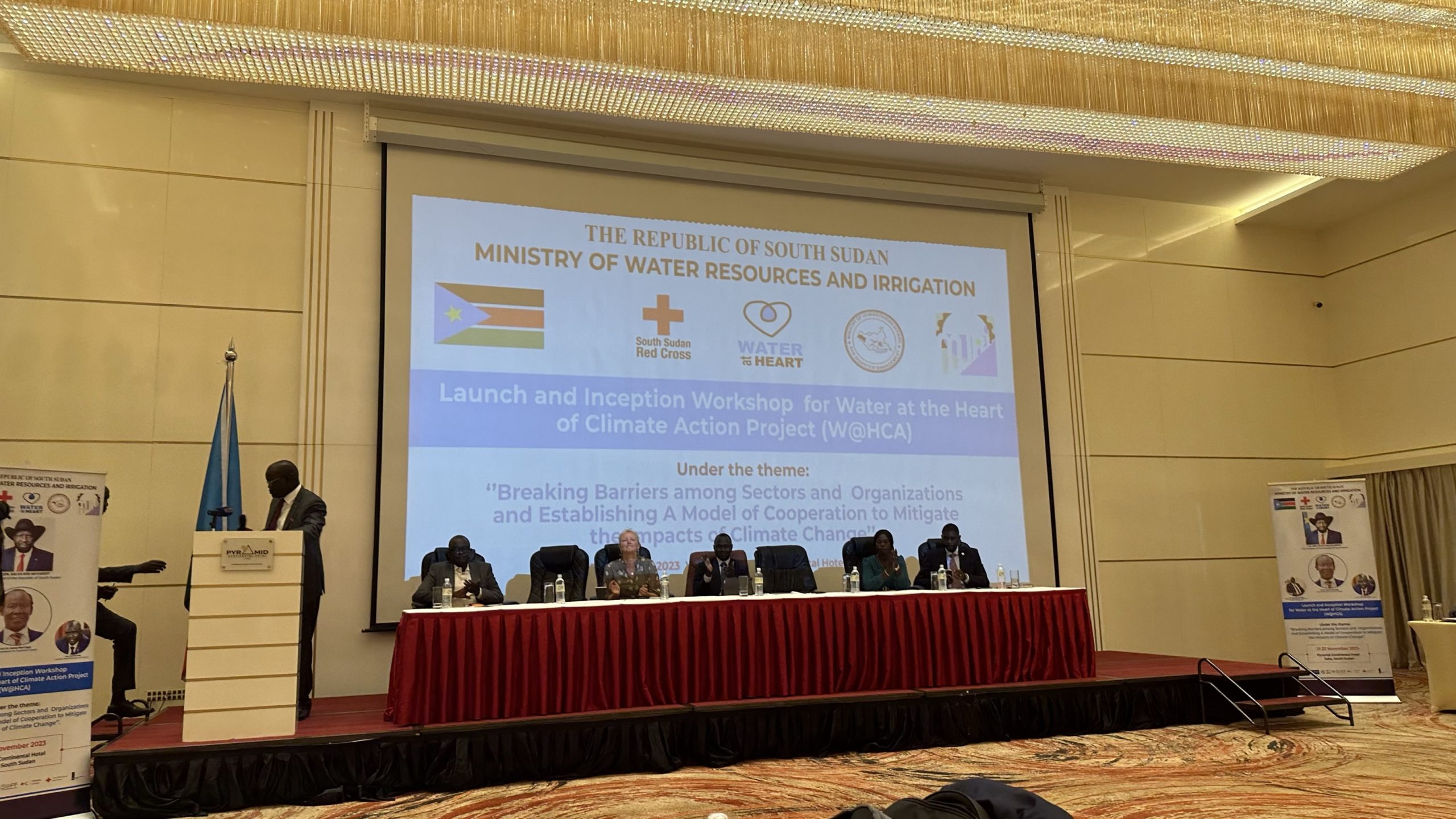The W@HCA project consortium of the World Meteorological Organization, The Netherlands Red Cross, South Sudan Red Cross, IFRC, UNDRR, and SOFF with the collaboration of national partners (South Sudan Government Humanitarian Affair and Disaster Management and Ministry of Water Resources and Irrigation) launched the Early Warning for All and Water at the Heart of Climate Action inception workshops on 20th November 2023 in Juba, South Sudan.
The overall objective of the EW4All launch and W@HCA inception workshop were to:
- Secure institutional buy-in for the EW4All initiative and W@HCA Project.
- Convene all relevant national and local actors across sectors to galvanize efforts (past, ongoing & future) to integrate, coordinate, consolidate and scale up MHEWS coverage.
- Jointly Co-Design the action plan for the inception phase of the W@HCA programme.
It’s crucial for governments to lead in promoting early warning systems through involvement of various stakeholders—like civil society, donors, and the private sector—can improve these systems’ effectiveness and longevity.


The inception workshop for the EW4All initiative and the W@HCA project had strong participation from a wide range of stakeholders, including government ministries, UN agencies, international and non-governmental organizations, partner national societies, and others. The final day saw a notable turnout, with over 100 attendees, highlighting the widespread interest and commitment to these initiatives. Despite the absence of some donors, the workshop maintained a positive atmosphere, demonstrating a collective determination to advance early warning systems and climate action efforts. The strong involvement of government ministries indicates a collaborative effort to shape the future of these initiatives.
By convening national and local stakeholders, the event participants have identified diverse gaps including but not limited to the following:
- Gaps include limited climate, water, and meteorological data, river level monitoring, short-term funding, limited human resources, and expertise in DRR and climate science.
- Challenges involve limited EW activities at the community level, a lack of trained volunteers, missing emergency response plans at the county level, and insufficient warehousing at the county level.
- Issues include limited country risk profiles, vulnerability assessments at the community level, and a lack of actual monitoring stations in the country.
- Challenges in dissemination include awareness creation, lack of curriculum for school-based DRR, limited feedback on advisories, communication gaps, and funding constraints.
- Challenges include low response capabilities, absence of clear Early Action protocols, limited training and simulation on preparedness and response, and the need for standard operating procedures (SOPs) and governance structures.
The presence of a dedicated ministry focusing on Disaster Risk Management (DRM) presents a significant opportunity for coordinated efforts in South Sudan. Endorsement of the DRM policy by the Cabinet further solidifies this opportunity, providing a strong foundation for strategic planning and implementation. The establishment of Disaster Risk Management Committees (DRMC) at various levels enhances coordination and ensures a cohesive approach to risk management. Additionally, the ongoing development of a DRM bill offers the chance to strengthen the legal framework surrounding disaster management. The existence of a National DRM Strategy and Plan of Actions provides a strategic roadmap for disaster preparedness and response. Being selected as one of the countries for the EW4ALL initiative not only signifies recognition but also brings valuable support and resources for enhancing early warning systems. Collaborating with the World Bank-supported Government of South Sudan (GoSS) and International Organization for Migration (IOM) on the Emergency Crisis Response Project (ECRP) presents funding opportunities and avenues for effective implementation. Leveraging the existing multi-hazard approach to address all four pillars of the Early Warning System (EWS) ensures comprehensive risk management. Furthermore, having existing strategies and action plans in place streamlines implementation efforts, facilitating efficient progress. Engaging with communities and fostering collaboration among organizations at all levels are essential opportunities for ensuring the successful implementation of the EW4ALL initiative.
In the breakout sessions focusing on each pillar, attendees pinpointed deficiencies within the nation’s Early Warning System. Following this, they suggested a series of priority measures, particularly concerning water, which build upon the gap analysis conducted for each pillar. The suggested actions are slated for implementation within the framework of the “Water at the Heart of Climate Action” Project.
Feedback from participants highlights a common issue where well-designed projects initiated at the national level often fail to extend their reach beyond that level during implementation. To address this, suggestions were made to ensure that action plans incorporate mechanisms for reaching the most affected individuals at the grassroots level, particularly during disasters. The principle of “Start what you can complete” was emphasized to encourage stakeholders to commit fully to planned initiatives. Concerns were raised regarding the lack of successful implementation of previously launched projects in South Sudan, underscoring the importance of ensuring the successful execution of future projects for the benefit of communities. Participants stressed the need for project planning to occur at the local level rather than solely at headquarters or the national level, urging implementers to consider local contexts and needs.
